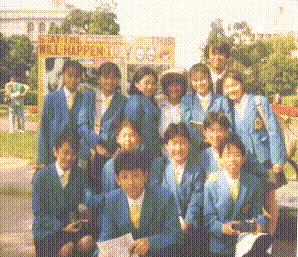
International Plan
The Proposition One Committee believes it is highly unlikely that any country with nuclear arms would ever unilaterally disarm. The greatest contributors to the nuclear arsenals are the U.S. and the Commonwealth of Independent States, or the former Soviet Union (primarily, at this point, Russia). Proposition One would only "become effective (in the U.S.) as soon as the Commonwealth of Independent States ratify a comparable amendment." If the bill currently in Congress is enacted, ALL countries possessing nuclear weapons would need to join the U.S. in mutual and simultaneous disarmament.
Some people ask, "What about the other countries that don't have nuclear weapons but might develop them?"
This amendment can be a cornerstone of trust for fellow human beings. Proposition One in and of itself doesn't create trust. Trust must be earned. In reality, nations will still be reliant on verification. It is the combination of a nation eliminating nuclear weapons -- with proof that they really have -- and proof of no desire to dominate, one nation over another, that has the potential for trust.
Using existing technologies, verification is entirely plausible
In the 1980's, former Secretary of Defense Harold Brown said, "Our 'national technical means' enable us to monitor all key aspects of Soviet strategic programs, including the development, testing, production, deployment, training, and operations of Soviet strategic capabilities. We can perform these tasks despite the closed nature of Soviet society."
Satellite photographs are so accurate that defense personnel have read license plates on cars from space.
These "national technical means," augmented by on-site observers and "other means" (e.g., spies), apply equally to verification in all nuclear countries. Additionally, nuclear weapons production facilities and nuclear enrichment facilities for producing weapons-grade plutonium are extremely complicated, requiring both vast resources and technical expertise. In the richest countries, these processes take ten or more years to develop.
The idea that these sophisticated processes could go unnoticed for very long is dismissed out-of-hand by defense and intelligence experts. Long before a new defense system could come "on line" the international community would have time to react.
Once detection of a violation of the international consensus might occur, a whole gamut of pressures are available.

